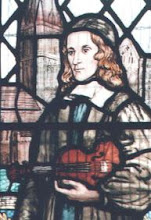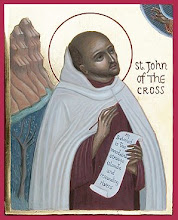
I'm still in awe of George Herbert, as a poet, theologian, priest, as one charting a via media course against the increasing pressures of radicalism. After the death of King Charles, Andrew Marvell lamented that we have become the barbarians we feared and heard not the cultured voice of George Herbert (who was then deceased).
There is much academic weight and attention focussed on John Milton, John Donne, Shakespeare, Andrew Marvell, Ben Jonson & the Tribe of Ben - yet with all of the attention directed at 16th & 17th Century British Poetry George Herbert has remained a Poet's Poet and seen as a lesser John Donne the Divine. Nigel Smith has recently written a book,
Why John Milton is Greater than Shakespeare? While I am tempted to agree with him that we are more in need (whatever that means) of John Milton's love of liberty, learning and and deep knowledge of all things human, I am soundly of the conviction that
what we need is George Herbert (oddly Elizabeth Bishop agreed) - we need the
middle way; a course that becomes so fluid that the horizontal line and vertical lines are replaced by communicative intimacy (H.Vendler). Herbert places the priority of this 'place' before & next to God (this communicative openness to address & redress God --- a communicative discourse that is based in the Eucharist) with the mystery itself as 'answer' and as 'truth' because it is itself the real intimacy and the via media of life in God.
I was deeply disturbed by some of the statements by Primates and Bishops (as can be seen on YouTube.com) regarding the Lambeth 2008 conference and their non attendance - my thoughts immediately went to George Herbert & the Little Gilding of Farrar. The puritan's ransacked Little Gilding and destroyed a vast number of first draft George Herbert poems & translations to clean-up the faith. They destroyed as an expression of their faith - their anger and violence used to force others to conform to their ideas. The only defense against the new puritanism is a return to the mystery and the hidden intimacy of our co-mingled voices that cry out to God in honest unknowing.
A new puritanism, a neo-puritanism, or to be blunt a neo-fundamentalism is threatening yet another denomination, the Anglican Communion world wide. Again a faction of a community has ventured to believe that the finite can possess the infinite in its totality - that the Truth can be comprehended by those who have access only to the truth ("for now I see only through a glass darkly") - that their 'knowing' of these truths is to say that some people are not allowed into the intimacy of God. The line of the horizon, if followed in depth and not just breath, brings us all back around to yourselves again. The horizontal intimacy of God with humanity in the one who is the union of the infinite and the finite becomes open to all humanity in the embrace of the crucified one, the one who is with us - for us - and in us, defies the gating off of intimacy with God, rejects the barring of communion and service, and opens the call to a life of fellowship and communion to all - male, female, straight, gay, old, young - called in the richness of their differences - flowers of God.
The Archbishop of Canterbury, Rowan Williams, could do worse that appoint a select diverse group of knowledgeable people to develop a mediative or contemplative / prayful approach to George Herbert's
Temple to be used as a personal & corporate meditation and worship tool - alongside a celebration of Little Gilding & its Ideal (which so moved T.S. Eliot). Mystery & Beauty might be a strong cure against the obscene litmus tests of the neo-fundamentalist and their dated interpretation of Scriptures (whose violence has not been changed in the process).

The most powerful critique of Rome's reactionary theology (typified in the Council of Trent and the repressive Inquisition of the Church of Rome came from the mystical beauty of the poetry of St John of the Cross (St John of the Cross entered the Carmelite novitiate in 1563, the same year the Council of Trent was concluded) and visions of intimacy of Teresa of Avila. They provided an immanent critique that was neither reactionary nor damning - they simply remembered the beauty of the mystery of God and in their contemplation and prayer sought God in the mystery. George Herbert's contemplation of God speaks to us in much the same manner. In our pain, anger, happiness, loneliness, joy, and devotion, George Herbert's
The Temple joins us in our calling out to the God who is with us without distinction. Our calling out to God joins us together in a clasping of hands, holding in our hands the other, each other, God:
Clasping of hands
LOrd, thou art mine, and I am thine,
If mine I am: and thine much more,
Then I or ought, or can be mine.
Yet to be thine, doth me restore;
So that again I now am mine,
And with advantage mine the more,
Since this being mine, brings with it thine,
And thou with me dost thee restore.
If I without thee would be mine,
I neither should be mine nor thine.
Lord, I am thine, and thou art mine:
So mine thou art, that something more
I may presume thee mine, then thine.
For thou didst suffer to restore
Not thee, but me, and to be mine,
And with advantage mine the more,
Since thou in death wast none of thine,
Yet then as mine didst me restore.
O be mine still! still make me thine!
Or rather make no Thine and Mine!



 I'm still in awe of George Herbert, as a poet, theologian, priest, as one charting a via media course against the increasing pressures of radicalism. After the death of King Charles, Andrew Marvell lamented that we have become the barbarians we feared and heard not the cultured voice of George Herbert (who was then deceased).
I'm still in awe of George Herbert, as a poet, theologian, priest, as one charting a via media course against the increasing pressures of radicalism. After the death of King Charles, Andrew Marvell lamented that we have become the barbarians we feared and heard not the cultured voice of George Herbert (who was then deceased).





